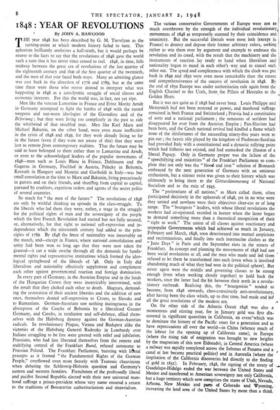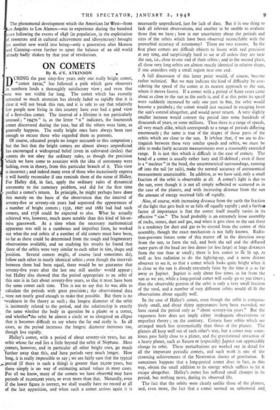1848: YEAR OF REVOLUTIONS
• By JOHN A. HAWGOOD
THE year 1848 has been described by G. M. Trevelyan as the turning-point at which modern history failed to turn. This aphorism brilliantly enshrines a half-truth, but it would perhaps be nearer to the facts to say that the revolutions of 1848 gave the world such a turn that it has never since ceased to reel. 1848, in time, falls midway between the great era of revolutions of the last quarter of the eighteenth century and that of the first quarter of the twentieth, and the men of that year faced both ways. Many an admiring glance was cast back in the direction of 1776 and 1789, but at the same time there were those who strove instead to interpret what was happening in 1848 as a cataclysmic struggle of social classes and economic interests. For this the world was, in fact, not yet ripe.
Men like the veteran Lamartine in France and Ernst Moritz Arndt in Germany attempted to fight the battles of 1848 with the rusted weapons and out-worn ideologies of the Girondists and of. the Befreiung ; but they were living too completely in the past to ride the whirlwind of that troubled year. Men like Karl Marx and Michael Bakunin, on the other hand, were even more ineffective in the crisis of 1848 and 1849, for they were already living so far in the future (even if they were not aware of this) that they were just as remote from contemporary realities. That the future may be said to have belonged to them rather than to Lamartine and Arndt, or even to the acknowledged leaders of the popular movements of 1848—men such as Louis Blanc in France, Dahlmann and the Gagerns in Germany, Fischhof in Austria, Palacky in Bohemia, Kossuth in Hungary and Mazzini and Garibaldi in Italy—was but small consolation at the time to Marx and Bakunin, living precariously in garrets and on their friends, and shuttling from capital to capital, pursued by creditors, expulsion orders and agents of the secret police of several countries.
So much for " the men of the future." The revolutions of 1848 are only by wishful thinking an episode in the class-struggle. To the liberals who led them they were, rather, a stage in the struggle for the political rights of man and the sovereignty of the people which the first French Revolution had started but not fully secured, or, alternatively, for that right to national self-expression and in- dependence which the nineteenth century had added to the prin- ciples of x789. By 1848 the force of nationality was inexorably on the march, and—except in France, where national .consolidation and unity had been won so long ago that they were now taken for granted—it cut a wide swathe through all the demands for funda- mental rights and representative institutions which formed the ideo- logical springboard of the liberals of '48. Only in Italy did liberalism and nationality effectively supplement and complement each other against governmental reaction and foreigp domination.
In every part of Germany, in the Austrian Empire and in the lands of the Hungarian Crown they were inextricably intertwined, with the result that they choked each other to death. Magyars, demand- ing the restoration of their ancient liberties and the addition of new ones, themselves denied self-expression to Croats, to Slovaks and to Rumanians. German-Austrians saw nothing incongruous in the absorption of the Czechs of Bohemia by a liberalised Greater Germany, and Czechs, in retaliation and self-defence, allied them- selves with the Habsburg dynasty against the German-Austrian radicals. In revolutionary Prague, Vienna and Budapest alike the victories of the Habsburg General Radetzky in Lombardy over Italians struggling to be free were greeted with relief and jubilation. Prussians, who had just. liberated themselves from the remote and stultifying control of the' Frankfurt Bund, refused autonomy to Prussian Poland. The Frankfurt Parliament, bursting with liberal precepts as it framed " the Fundamental Rights of the German People," overflowed even more fiercely with Teutonic chauvinism when debating the Schleswig-Holstein question and Germany's eastern and western frontiers. Frenchmen of the professedly liberal and pacifist Second Republic elected with their new universal man- hood suffrage a prince-president whose very name ensured a return to the traditions of Bonapartist authoritarianism and imperialism.
The various conservative Governments of Europe were not so much overthrown by the strength of the individual revolutionary movements of 1848 as temporarily stunned by their coincidence and unanimity. But the successful liberals were most loth (except in France) to destroy and depose their former arbitrary rulers, seeking
.rather to win them over by argument and example to embrace the revolution and its creed, with the result that the machinery and the instruments of reaction lay ready to hand when liberalism and nationality began to stand, in each other's way and to cancel each
other out. The speed and completeness with which the clock was put back in 1849 and 185o were even more remarkable than the extent
and comprehensiveness of the success of revolution in 1848. By the end of 1850 Europe was under authoritarian rule again from the English Channel to the Urals, from the Pillars of Hercules to the 4 Golden Horn.
But it was not quite as if 1848 had never beep. Louis Philippe and Metternich had not been restored to power, and manhood suffrage remained in bath France and Switzerland ; Prussia had a constitution of sorts and a national parliament ; the remnants of serfdom had disappeared for ever from the Austrian Empire ; Pan-Slavism had been born, and the Czech national revival had kindled a flame which
none of the misfortunes of the succeeding ninety-five years were to put out ; the heroic role played by the kingdom-of Piedmont-Sardinia
had provided Italy with a constitutional and a dynastic rallying point which had hitherto not existed, and had unmasked the illusion of a liberal. Papacy. Only in Germany proper was the failure of the " speechifying and majorities " of the Frankfurt Parliament so com- plete that not only was the " blood and iron " solution of Bismarck embraced by the next generation of Germans with an ominous
enthusiasm, but a sinister twist was given to their history which was ultimately to bring them to the Genterdiimmerung of National Socialism and to the ruin of 1945.
The " proletarians of all nations," as Marx called them; often participated decisively in the upheavals of 1848, yet in no wise were they united and nowhere were their objectives clear-cut or of long range. The " bourgeois " leaders, with whose liberal revolutions the workers had co-operated, recoiled in horror when the latter began to demand something more than a theoretical recognition of their " right to work." The union of all classes against reactionary and unpopular Governments which had achieved so much in January, February and March, 1848, soon deteriorated into mutual suspicions and recriminations, and finally into such internecine clashes as the " June Days " in Paris and the September riots in the streets of Frankfurt. In concept and planning the movements of 1848 had not been social revolutions at all, and the men who made and led them refused to let them be transformed into such (even when it involved abandoning much of what they had won in the political sphere). But never again were the middle and governing classes to be strong enough (even when working closely together) to hold back the workers, once the latter had the bit between their teeth in a revolu- tionary outbreak. Realising this, the " bourgeoisie " tended to become, from 1848 onwards, class-consciously anti-revolutionary, after having been the class which, up to that time, had made and led all the great revolutions of the modern era.
On the other side of the Atlantic Ocean 1848 was also a momentous and stirring year, for in January gold was first dis-
covered in significant quantities in California, an event-which was
to dominate the history of the Pacific coast for a generation and to have repercussions all over the world—in China (whence much of the labour for the opening up of California came), in Europe (where the rising tide of emigration was brought to new heights by the magnetism of this new Eldorado), in Central America (where
a railway was rapidly completed across the Isthmus of Panama and a canal at last became practical politics) and in Australia (where the inspiration of the California discoveries led directly to the finding of gold in 1851). In February, 1848, the signing of the treaty of .4 Guadalupe-Hidalgo ended the war between the United States and Mexico and transferred to American sovereignty not only California, • but a huge territory which now comprises the states of Utah, Nevada, Arizona, New Mexico and parts of Colorado and Wyoming, increasing the land area of the United States by more than a third. The phenomenal development which the American far West—from s Angeles to Los Alamos—was to experience during the hundred ears following the events of 1848 (in population, in the exploitation of resources and in cultural achievement and idiosyncrasy) brought yet another new world into being—only a generation after Monroe and Canning—even further to upset the balance of an old world already badly shaken by that year of-revolutions.







































 Previous page
Previous page